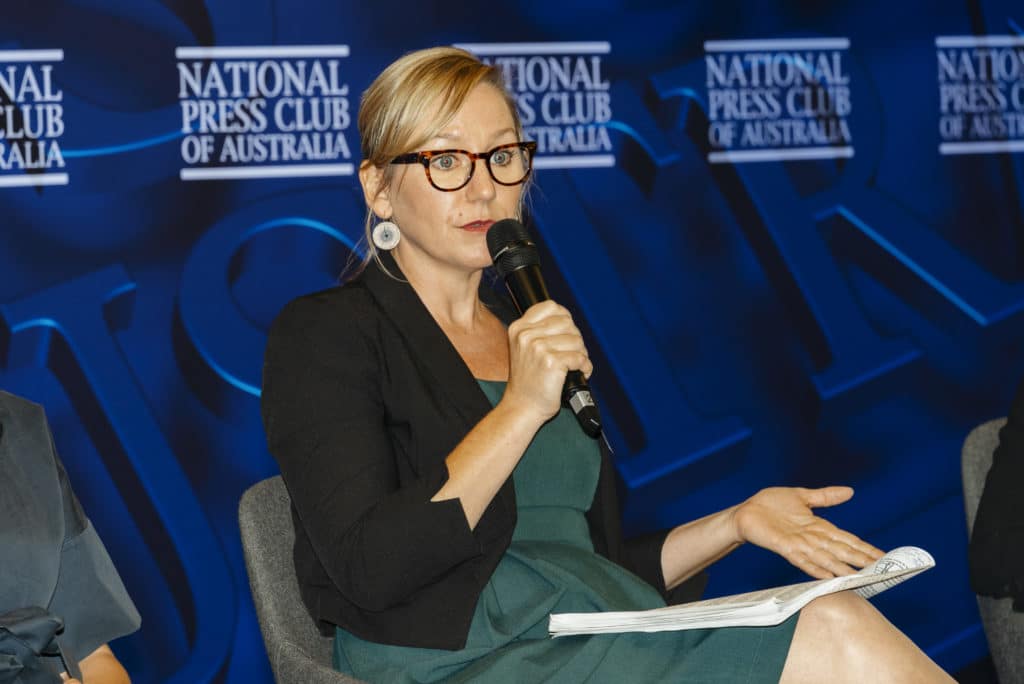Climate action is a feminist issue, writes Senator Larissa Waters. She shares more, after joining Women’s Agenda for the launch of The Climate Load at the National Press Club in Canberra.
We all know that the climate crisis is also a health and social crisis. It intersects and exacerbates all existing inequities and challenges. But what the research behind The Climate Load report confirms is that the climate crisis is also gendered. Climate action is a feminist issue.
The costs of the climate crisis on our planet and communities are immense, extending beyond natural impacts to social infrastructure around health, peace and conflict, trade, migration, and built infrastructure like transport systems, housing and schools.
And those impacts will be felt hardest by the poor, and disproportionately this means women and children.
We know that the emotional and practical load of caring for children as life is upended by extreme weather most often falls to women. Not just getting to safety, but dealing with the realities of disrupted schooling, housing and health issues, as the report details.
Critical sexual and reproductive healthcare services are also impacted – pharmacists can’t fill contraception scripts, support services are closed or at capacity, and clinics and hospitals are damaged, exacerbating access issues in rural and remote regions where services are already at breaking point.
And, of course, housing. Without safe places to escape to, women and children stay in dangerous situations. The lack of women’s economic security already sees older women as the fastest growing cohort of homeless. We need a huge program of building resilient, affordable housing so women can keep a roof over their head, including during disasters.
The UN estimates that 80 per cent of people globally already displaced by climate crises are women – a shocking figure that could grow as the climate crisis worsens. When women are displaced, and removed from support networks and family, they are at greater risk of violence, including sexual violence. As many as one in five women displaced by natural disasters or political unrest has been subjected to sexual violence.
As a wealthy country, and one of the largest exporters of fossil fuels, we have a responsibility to contribute fairly to aid and reparations for our ongoing role in the climate crisis and its impact on women.
Violence against women during and after natural disasters is of course not limited to developing countries. I was pleased to see the new National Plan to End Violence Against Women and Children acknowledge that the stress, disruption and turbo-charging of inequalities during disasters increase the likelihood and severity of violence against women and children. Emergency response planning must therefore involve women and include strategies to address gendered violence. I look forward to seeing an Action Plan, due before July 2023, that sets out clear plans for ensuring emergency responses consider these issues.
Ensuring we’re supporting First Nations women and communities to lead climate action, emergency responses, mitigation and adaptation is key to the climate crisis response.
Across the country, First Nations women are standing against fossil fuel projects in the Beetaloo Basin, Liverpool Plains, the Burrup Peninsula, and beyond. They are not giving their free, prior and informed consent to these toxic projects that wreck the climate and trash cultural heritage and biodiversity. Aboriginal and Torres Strait Islander peoples have been living sustainably for generations, and their knowledge and experience can help protect Country for future generations.
They are standing up because, like the science, they understand that the climate cannot afford any new coal and gas projects, and nor can our communities. We have already felt the devastation of record floods, fires, heatwaves, and we can’t accept that the private greed of Big Coal and Big Gas will lock that future in for everyone to come. Not when the economic and employment opportunities in renewable energy could bring such stability and prosperity to regional communities.
What remains uplifting and hopeful is that climate mitigation and adaptation is being led by women. It’s not a coincidence that the young people we see leading climate action around the globe are women – Greta Thunberg, Vanessa Nakate, Anjali Sharma, Amelia Telford and so many more – women care about the future, they see the impacts coming for their families, and know we need to act to stop them. And women get shit done.
Globally, women are at the coal face of climate impacts and our wisdom and experience needs to be at the forefront of designing impactful, compassionate and intersectional responses to the climate crisis.
We’ve been on the frontlines of social change at every critical juncture, and we’re here again facing down the vested interests of mining billionaires to ensure we have a planet for our kids and theirs.
You can find more on the Women’s Agenda March 2023 report, The Climate Load, here.


